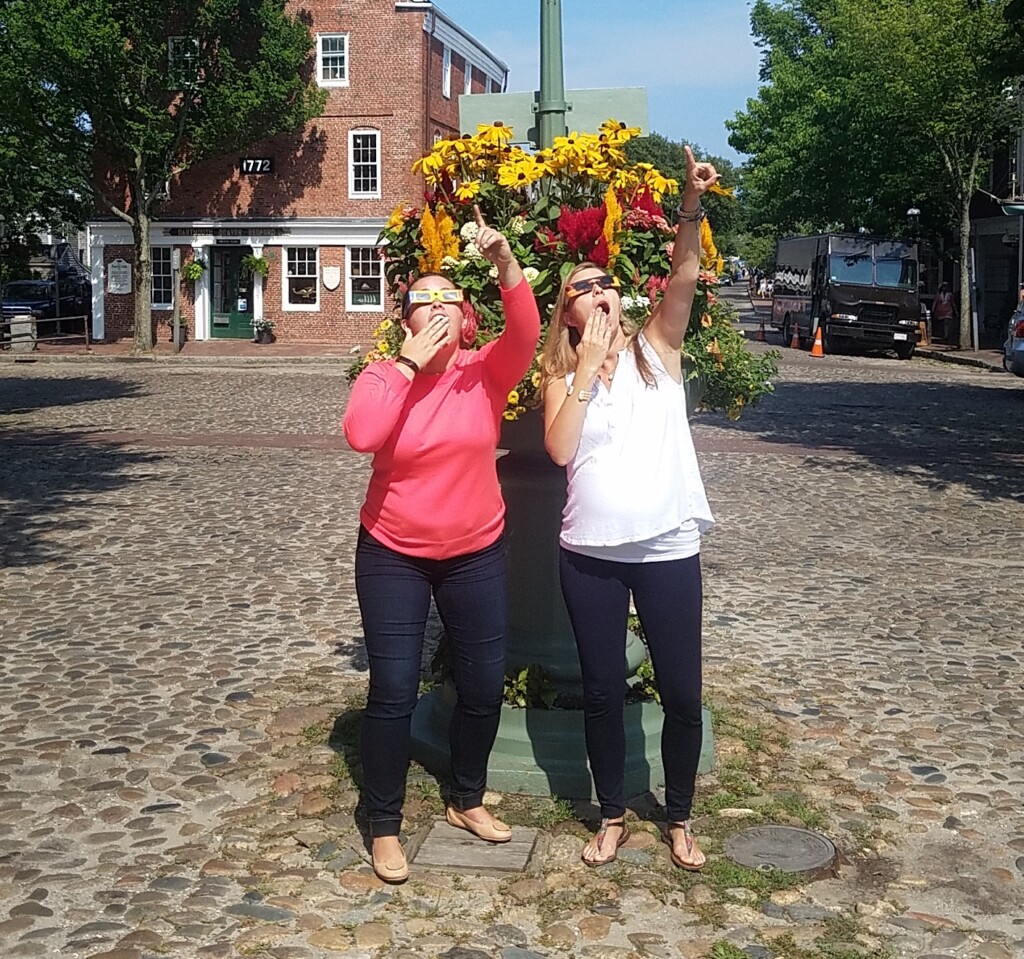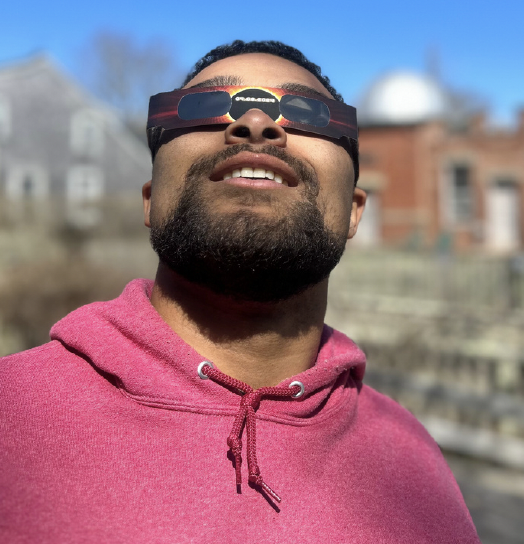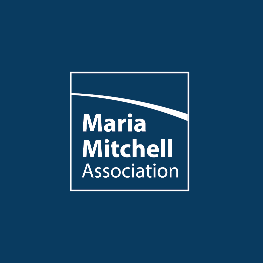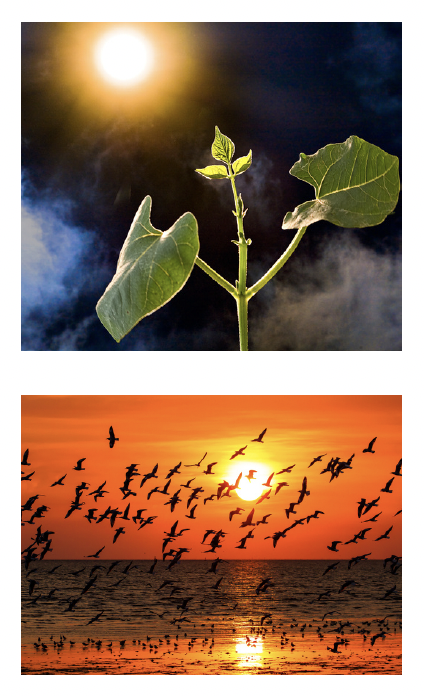The Great North American Eclipse
A Partial Solar Eclipse on Nantucket, Monday, April 8, 2024
A Blog from Maria Mitchell Association on Nantucket

What? Why? Where?
On April 8, 2024 a total solar eclipse will cross the North American continent. During a total solar eclipse the Sun, Earth, and Moon are aligned in such a way that the disk of the Moon appears to completely cover the disk of the Sun for a few minutes. This special alignment creates a totally dark shadow on a small patch of the surface of the Earth, approximately 115 miles wide. This shadow will follow a path across North America beginning on the western coast of Mexico, and traveling North and East through Texas, the midwestern states, and up through Maine.

Totality and What it Means
During totality the sky suddenly becomes like nighttime – in the middle of the day! The stars and planets become visible in the dark sky, the temperature drops, and birds and other animals behave erratically because it is suddenly nighttime in the middle of day. In addition, if you are in the path of totality, you can safely look directly at the totally eclipsed Sun to view the amazingly beautiful, extended solar corona – the million degree, tenuous, and extended outer atmosphere of our Sun. We can’t normally see the corona of the Sun because the brightness of the solar disk far outshines the light from the corona. Being in the path of totality of a solar eclipse is an experience like no other!
What to Expect on Nantucket
Here on Nantucket, which is located outside the path of totality, the eclipse will be partial. At the height of the eclipse, the Moon will cover approximately 87% of the disk of the Sun. If it’s a clear day, you may notice that the daylight becomes slightly less bright, as if there were some light cloud coverage and shadows on the ground may become more sharp.
To properly use solar glasses, first look at the ground, then place the solar glasses over your eyes, and then look up at the sky with glasses on. DO NOT LOOK AT THE SUN UNTIL YOUR GLASSES ARE PROPERLY PLACED OVER YOUR EYES.
Here on Nantucket, the eclipse begins at 2:17pm and ends at 4:39pm. Maximum partial eclipse happens at 3:30pm.

With safe solar viewing glasses, you will be able to watch the disk of the Moon slowly cross over the disk of the Sun. At the beginning (and end) It will look like a small “bite” is taken out of the solar disk. This “bite” will get bigger and bigger, until eventually, the Sun will look like a thin crescent. At this stage, it is great to look at a pinhole projection of the Sun – as the normally fuzzy, mostly circular projected shape will appear instead as a crescent.
 In honor of the occurrence of this astronomical phenomenon, the MMA will host a series of events during the week preceding the eclipse and on the day of the eclipse. These programs will be led by Dr. Regina Jorgenson, MMA Director of Astronomy; August Muller and Emmy Wisz, current MMA Astronomy Post-baccalaureate Research Fellows; and Celia Mulcahey and Fiona Powers Özyurt, former MMA Astronomy Post-Baccalaureate Research Fellows.
In honor of the occurrence of this astronomical phenomenon, the MMA will host a series of events during the week preceding the eclipse and on the day of the eclipse. These programs will be led by Dr. Regina Jorgenson, MMA Director of Astronomy; August Muller and Emmy Wisz, current MMA Astronomy Post-baccalaureate Research Fellows; and Celia Mulcahey and Fiona Powers Özyurt, former MMA Astronomy Post-Baccalaureate Research Fellows.
From April 1 through 5, the MMA will partner with Nantucket Public Schools to ensure that all students in the district are prepared to safely view this spectacular event. Nantucket Elementary and Intermediate schools will host MMA guest astronomy educators, alongside district teachers, to provide a hands-on opportunity to learn about eclipses, eclipse-centered activities, and the steps to safely view a solar eclipse. At Cyrus Peirce Middle School, and Nantucket High School, MMA astronomers will lead an interactive workshop style presentation on eclipses and their safe viewing. On the evening of April 3, Dr. Regina Jorgenson, MMA Director of Astronomy, will lead a virtual public talk about the history of eclipses and the safety measures necessary when viewing them for the public.
On Saturday April 6, the MMA will lead several hands-on activities for the community such as making pinhole projectors and eclipse models. At the Hinchman House Natural Science Museum, curious junior astronomers, ages three through eleven, can also enjoy Astro-Story Hour and a free eclipse workshop. The MMA Solar Eclipse Week will culminate on the day of the eclipse at Nantucket High School’s old baseball field at 14:45 EDT. On April 8, the MMA, Nantucket Public School District, Nantucket Community School, and the Nantucket Boys’ and Girls’ Club will collaborate to ensure that all students can safely view the eclipse on-site, after school dismissal.
Nantucket Public Schools will provide safe solar eclipse glasses to each student prior to dismissal and students can walk over to the field where MMA astronomy staff will facilitate a variety of safe, sun observing methods, view live feeds of the total eclipse, answer questions, and lead various enrichment activities for students. All local students and families are welcome to attend. The event is free and open to the public to give participants the opportunity to safely view this partial eclipse through the MMA’s solar telescope and Sun Spotter.
DID YOU KNOW?
The last total solar eclipse in North America was on August 21, 2017. This will be the last total solar eclipse to cross the North American continent for the next twenty years! The next total solar eclipse in North America will occur on August 23, 2044. The next total solar eclipse on Nantucket will occur on May 1, 2079.
The earliest written record we have of Maria Mitchell’s work in astronomy comes with the solar eclipse of February 12, 1831 which was seen along the eastern seaboard, and its totality was central to Nantucket.
Maria made a 1,500 mile journey to Burlington, Iowa with eight of her female students for the total solar eclipse on August 7, 1869. Their findings were printed in a U.S. Navy report of the eclipse.
Maria witnessed a third eclipse in Denver, Colorado in July 1878, and on reflecting on this eclipse Maria said, “They who look through telescopes at the time of a total eclipse are martyrs; they severely deny themselves. The persons who can say that they have seen a total eclipse of the sun are those who rely upon their eyes . . .”
Animals and Nature React to Solar Eclipses!
 During a total solar eclipse domestic animals can become spooked or get nervous with a sudden disruption of natural light and it can be very confusing for these animals especially when human behavior goes on as “normal.” Wild animals, driven by instinct, respond by engaging in nighttime activities when the sky darkens prematurely.
During a total solar eclipse domestic animals can become spooked or get nervous with a sudden disruption of natural light and it can be very confusing for these animals especially when human behavior goes on as “normal.” Wild animals, driven by instinct, respond by engaging in nighttime activities when the sky darkens prematurely.
Plants respond to total solar eclipses as they would respond to nightfall. Scientists have observed slowing rates of both photosynthesis and transpiration. Photo-responsive plants prematurely close their buds or petals and have even been observed drooping their leaves. Some plants and trees exhibit changes in their sap flow as well.
Bird and insect vocalizations, feeding habits, and flight patterns are impacted before, during, and after a total solar eclipse. Typically, their chirps and buzzes are cacophonous (produce a harsh, discordant mixture of sounds) immediately preceding totality, but go fully silent at the peak of an eclipse. These changes are more likely in response to the rapid fluctuation in atmospheric temperature rather than light exposure.
Fisher is thrilled to collaborate with the Maria Mitchell Association this year to share in their mission to create opportunities for all to develop a life-long passion for science through education, research, and firsthand exploration of the sky, land, and sea of Nantucket Island. The Maria Mitchell Association (MMA) was founded in 1902 to preserve the legacy of Nantucket native astronomer, naturalist, librarian, and educator, Maria Mitchell. After she discovered a comet in 1847, Mitchell’s international fame led to many achievements and awards, including an appointment as the first female American professor of astronomy at Vassar College. Mitchell believed in “learning by doing” and today that philosophy is reflected in the MMA’s mission statement, programs, research projects, and other activities. The Maria Mitchell Association operates two observatories, a natural science museum, an aquarium, and a research center, while preserving the historic birthplace of Maria Mitchell. Programming includes camps, after school programming, open nights, speaker series, courses, festivals, symposiums, internships, and workshops. For more information, please visit mariamitchell.org.
The Great North American Eclipse Schedule
Monday April 1
Nantucket Elementary School Collaboration
Tuesday April 2
International Dark Skies Week Begins
Nantucket Elementary School Collaboration
Wednesday April 3
Nantucket Elementary School Collaboration
Science Speaker Series with Dr. Regina Jorgenson
Virtual/Zoom
7:00-8:00 PM
FREE, Register Here
Thursday April 4
Nantucket Elementary School Collaboration
Nantucket Intermediate School Collaboration
Nantucket High School All School Assembly
Look Up! At Loines Observatory
59 Milk Street Extension
8:00 – 9:00 PM
FREE, Register Here
Join MMA Astronomers for an impressive tour of the night skies during International Dark Skies Week. Get a chance to view the moon, planets, stars, nebulae, and even distant galaxies through MMA’s telescopes. Learn more about the constellations, phases of the moon, the planets, and why eclipses happen. This community-centered program is designed to be engaging and interactive for all ages with a special focus on children and young adults K-12. This free program is made possible, courtesy of the Weezie Foundation and other generous sponsors for students, educators, and families of Nantucket to visit the Loines Observatory and learn more about the night sky.
Friday April 5
Nantucket Elementary School Collaboration
Cyrus Peirce Middle School All School Assembly
Saturday April 6
Astro Story Hour
Hinchman House Natural Science Museum
7 Milk Street, Nantucket
10:15-11:15 AM
Enjoy this program designed for the young space explorer in your family! During this session, Joanna Roche, our Executive Director, will read an eclipse-themed book and will finish with an activity related to the story. At least one adult must sign up with children. This program is designed to be interesting for children ages 3 and older. This program meets at the MMA Natural Science Museum at 7 Milk Street, Nantucket MA. Pre-registration is recommended as programs do fill up, but walk-ins are welcome subject to availability.
“Preparing for the Eclipse on Nantucket, everything you need to know about the eclipse and how to make your own pinhole camera”
MMA Research Center
2 Vestal Street, Nantucket
2:00-4:00 PM
Join the MMA for an informational presentation about the upcoming solar eclipse, followed by a hands-on workshop during which participants will make their very own pinhole camera to use to safely observe the April 8 solar eclipse! During the presentation we will discuss eclipses, explain why they happen, answer your questions, and provide information about how to view the April 8 solar eclipse safely. The presentation will take place from 2pm-2:30pm and will be followed by the pinhole camera making workshop, from 2:30pm-4pm. You are welcome to attend either or both events. If you plan to attend the pinhole camera making workshop, please bring a shoebox or cereal box along with you (one for each participant that would like to make a pinhole camera). We will hand out eclipse glasses during this workshop.
Sunday April 7
Nature of Nantucket Podcast with Dr. Regina Jorgenson
WACK FM
7:20AM
Monday April 8
“The Great North American Eclipse”
Nantucket High School retired baseball field
2:30-4:30 PM
FREE, no registration required
Join the Maria Mitchell Association astronomy staff for a special and safe viewing of the upcoming Great North American Eclipse! We welcome all students and families to stop by to check out a view of the sun using safe solar viewing tools. There will be different stations and activities for all to enjoy. This free program is designed to be interesting for learners of all ages.
Solar Eclipse Details for Nantucket, April 8, 2024.
Partial Eclipse begins at 2:17PM
Maximum Partial Eclipse at 3:30PM
Partial Eclipse ends at 4:39PM

